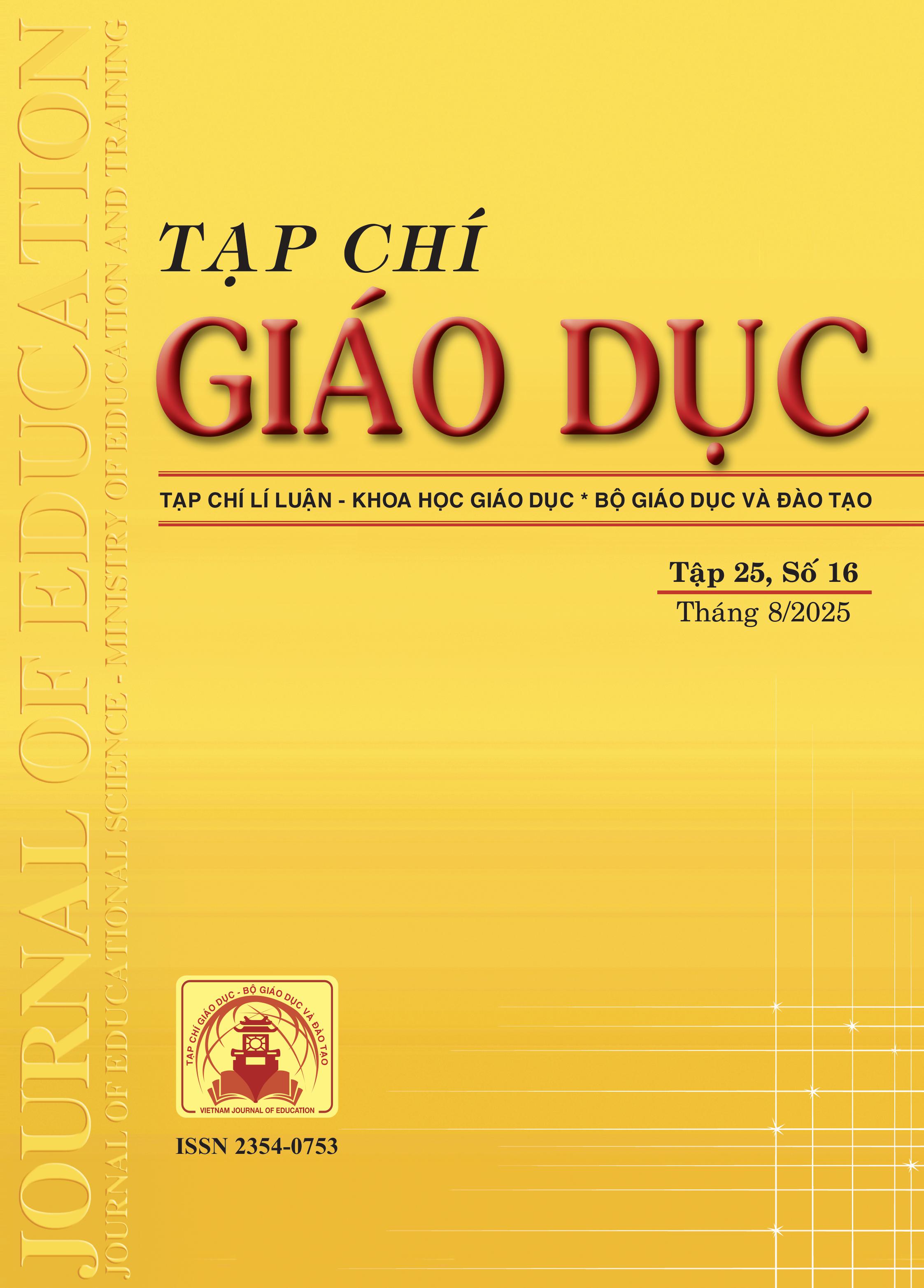Đo lường các yếu tố ảnh hưởng đến việc tham gia các hoạt động phát triển chuyên môn của giáo viên Khoa học tự nhiên ở Việt Nam: Xây dựng và kiểm định thang đo
Tóm tắt
Given the significance of professional development for lower secondary science teachers, identifying the factors influencing their participation in such activities tailored to the Vietnamese educational context is necessary. This study aims to develop and validate a questionnaire as a scale to evaluate the factors influencing science teachers’ decisions to engage in professional development. A mixed-method approach, combining both qualitative and quantitative methods, was employed to construct the measurement scale. The questionnaire items were initially generated through a comprehensive literature review and then refined via focus group discussions. To ensure the reliability and validity of the scale, data were collected from 404 science teachers with previous experience in professional development activities. After Exploratory Factor Analysis (EFA) had revealed eight factor groups, confirmatory Factor Analysis (CFA) was subsequently conducted to validate the factor structure. The questionnaire consisting of 55 observed variables would be used to enhance the understanding of the challenges faced by teachers when participating in professional development activities.
Tài liệu tham khảo
Ahmad, N., Rashid, S., & Ali, Z. (2023). Investigating primary school teachers’ perceptions about professional development and its impact on students achievement. Journal of Social Sciences Review, 3(1), 809-823. https://doi.org/10.54183/jssr.v3i1.234
Ajzen, I. (1991). The theory of planned behavior. Organizational Behavior and Human Decision Processes, 50(2), 179-211. https://doi.org/10.1016/0749-5978(91)90020-T
Anderson, J. C., & Gerbing, D. W. (1984). The effect of sampling error on convergence, improper solutions, and goodness-of-fit indices for maximum likelihood confirmatory factor analysis. Psychometrika, 49(2), 155-173. https://doi.org/10.1007/BF02294170
Bagozzi, R. P., Yi, Y., & Phillips, L. W. (1991). Assessing construct validity in organizational research. Administrative Science Quarterly, 36(3), 421-458.
Bayar, A. (2013). Factors affecting teachers' participation in professional development activities in Turkey. University of Missouri-Columbia.
Bộ GD-ĐT (2018a). Chương trình giáo dục phổ thông môn Khoa học tự nhiên (ban hành kèm theo Thông tư số 32/2018/TT-BGDĐT ngày 26/12/2018 của Bộ trưởng Bộ GD-ĐT).
Bộ GD-ĐT (2018b). Thông tư số 20/2018/TT-BGDĐT ngày 22/8/2018 quy định chuẩn nghề nghiệp giáo viên cơ sở giáo dục phổ thông.
Churchill Jr, G. A. (1979). A paradigm for developing better measures of marketing constructs. Journal of Marketing Research, 16(1), 64-73. https://doi.org/10.1177/002224377901600110
Chval, K., Abell, S., Pareja, E., Musikul, K., & Ritzka, G. (2008). Science and mathematics teachers’ experiences, needs, and expectations regarding professional development. Eurasia Journal of Mathematics, Science and Technology Education, 4(1), 31-43. https://doi.org/10.12973/ejmste/75304
Do, T. T., Hoang, K. C., Do, T., Trinh, T. P. T., Nguyen, D. N., Tran, T., ... & Nguyen, T. T. (2021). Factors Influencing Teachers' Intentions to Use Realistic Mathematics Education in Vietnam: An Extension of the Theory of Planned Behavior. Journal on Mathematics Education, 12(2), 331-348.
Fishbein, M., & Yzer, M. C. (2003). Using theory to design effective health behavior interventions. Communication Theory, 13(2), 164-183. https://doi.org/10.1111/j.1468-2885.2003.tb00287.x
Garet, M. S., Porter, A. C., Desimone, L., Birman, B. F., & Yoon, K. S. (2001). What makes professional development effective? Results from a national sample of teachers. American Educational Research Journal, 38(4), 915-945.
Garg, R., Rahman, Z., & Qureshi, M. N. (2014). Measuring customer experience in banks: scale development and validation. Journal of Modelling in Management, 9(1), 87-117. http://dx.doi.org/10.1108/JM2-07-2012-0023
Goh, P. S. C., Ng, P. K. M., & Tay, K. S. (2021). E-readiness measurement tool: Scale development and validation. Education and Information Technologies, 26(4), 4599-4619. https://doi.org/10.1080/2331186X.2021.1883829
Hair, J. F., Babin, B. J., Anderson, R. E., & Black, W. C. (2018). Multivariate data analysis (8th ed.). Cengage Learning.
Hair, J. F., Jr., Black, W. C., Babin, B. J., & Anderson, R. E. (2009). Multivariate data analysis (7th ed.). Pearson Prentice Hall.
Hair, J., Anderson, R., Tatham, R., & Black, W. (1998). Multivariate data analysis (5th ed.). Prentice Hall.
Huỳnh Thị Thúy Diễm, Đinh Minh Quan, Nguyễn Quyền Trân (2023). Thực trạng dạy học môn Khoa học tự nhiên của giáo viên trung học cơ sở ở vùng Đồng bằng sông Cửu Long. Chuyên san khoa học xã hội và nhân văn, Tạp chí Khoa học, Trường Đại học Đồng Tháp, 12(6), 22-29.
Levi-Keren, M., & Patkin, D. (2016). Mathematics Teachers' Professional Development Program-Needs and Expectations. International Journal for Mathematics Teaching and Learning, 17(1).
Montaño, D. E., & Kasprzyk, D. (2015). Theory of reasoned action, theory of planned behavior, and the integrated behavioral model. In Glanz, K., Rimer, B. K. & Viswanath, K. (Eds.), Health behavior: Theory, research, and practice (5th ed., pp. 95-124). Jossey-Bass/Wiley.
Nassar-McMillan, S.C., Wyer, M., Oliver-Hoyo, M., Ryder-Burge, A (2010). Using focus groups in preliminary instrument development: expected and unexpected lessons learned. The Qualitative Report, 15(6), 1629-1642.
Opfer, V. D., Pedder, D. J., & Lavicza, Z. (2011a). The influence of school orientation to learning on teachers' professional learning change. School Effectiveness and School Improvement, 22(2), 193-214.
Opfer, V. D., Pedder, D., & Lavicza, Z. (2011b). The role of teachers’ orientation to learning in professional development and change: A national study of teachers in England. Teaching and Teacher Education, 27(2), 443-453. https://doi.org/10.1016/j.tate.2010.09.014
Soine, K. M., & Lumpe, A. (2014). Measuring characteristics of teacher professional development. Teacher Development, 18(3), 303-333. http://dx.doi.org/10.1080/13664530.2014.911775
Van Driel, J. H., Meirink, J. A., Van Veen, K., & Zwart, R. C. (2012). Current trends and missing links in studies on teacher professional development in science education: A review of design features and quality of research. Studies in Science Education, 48(2), 129-160. https://doi.org/10.1080/03057267.2012.738020
Zhang, M., Parker, J., Koehler, M. J., & Eberhardt, J. (2019). Understanding in-service science teachers’ needs for professional development. Journal of Science Teacher Education, 30(3), 246-266. https://doi.org/10.1080/1046560X.2019.1606808
Zhang, S., Shi, Q., & Lin, E. (2020). Professional development needs, support, and barriers: TALIS US new and veteran teachers’ perspectives. Professional Development in Education, 46(3), 440-453.
Tải xuống
Đã Xuất bản
Cách trích dẫn
Số
Chuyên mục
Giấy phép

Tác phẩm này được cấp phép theo Ghi nhận tác giả của Creative Commons Giấy phép quốc tế 4.0 .












